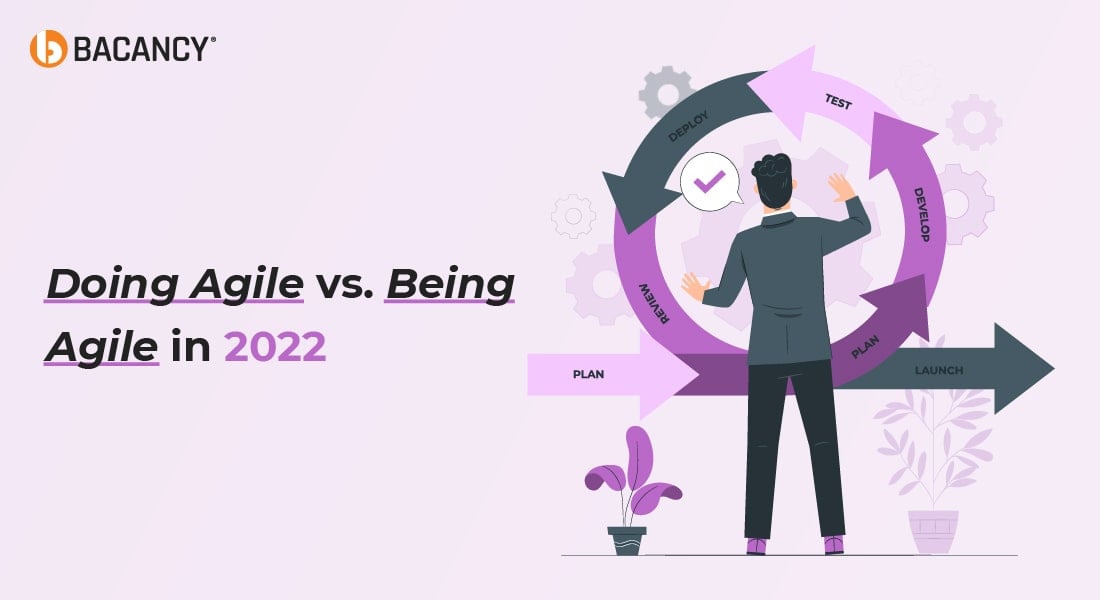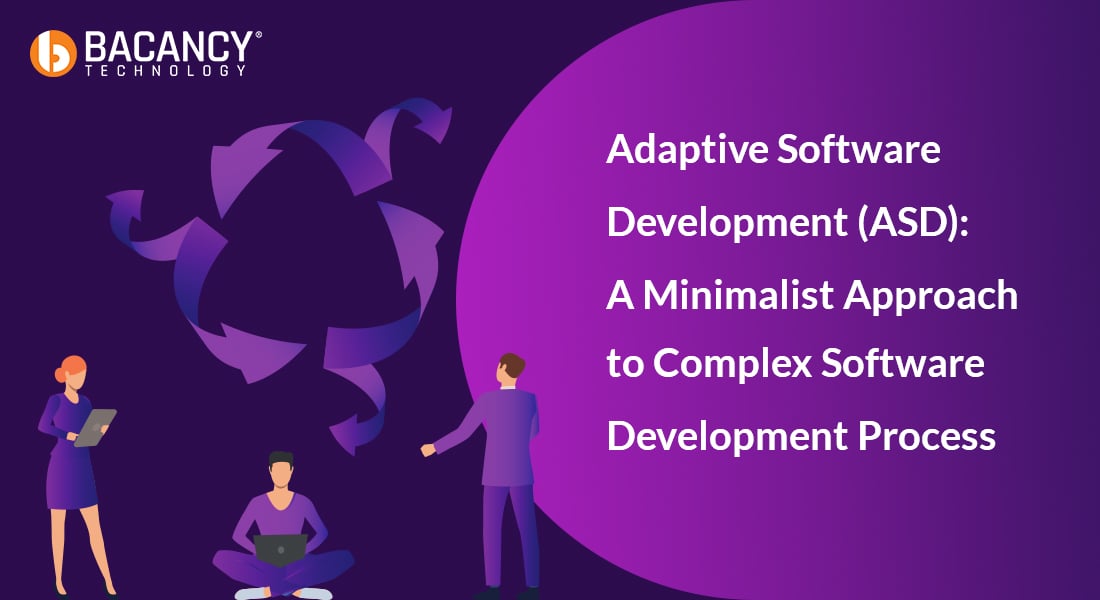Quick Summary:
There has been much debate going on if Agile and DevOps are friends or foes. if you are curious to know what essentially they are, why there’s a lot of debate on Agile vs DevOps, and what more there is to the above-mentioned short answer, read on!
Table of Contents
Modern Business Hurdles
We live in polarities of all sorts. Our minds and hearts have found it convenient to see things as divided. But, as the Great Masters have time and again tried to convey to us that division is only a perception and not the whole truth, it would be interesting to see how this age-old, profound spiritual truth is applicable even in the fast-paced, modern world of information and technology.
The Agile methodology took widespread traction in the early 2000s and it truly sorted the customer-vendor transactions and communication patterns which led to business welfare. Soon, it became a vital part of the IT software development processes, and it stood like a support wall against project failures and delays.
However, the Agile mindset did no help to the operations team who dealt with delivering and managing the developed software product. With this disruption, there arose the solution concept of DevOps which bridged the disruption gap between the development team and the operations team.
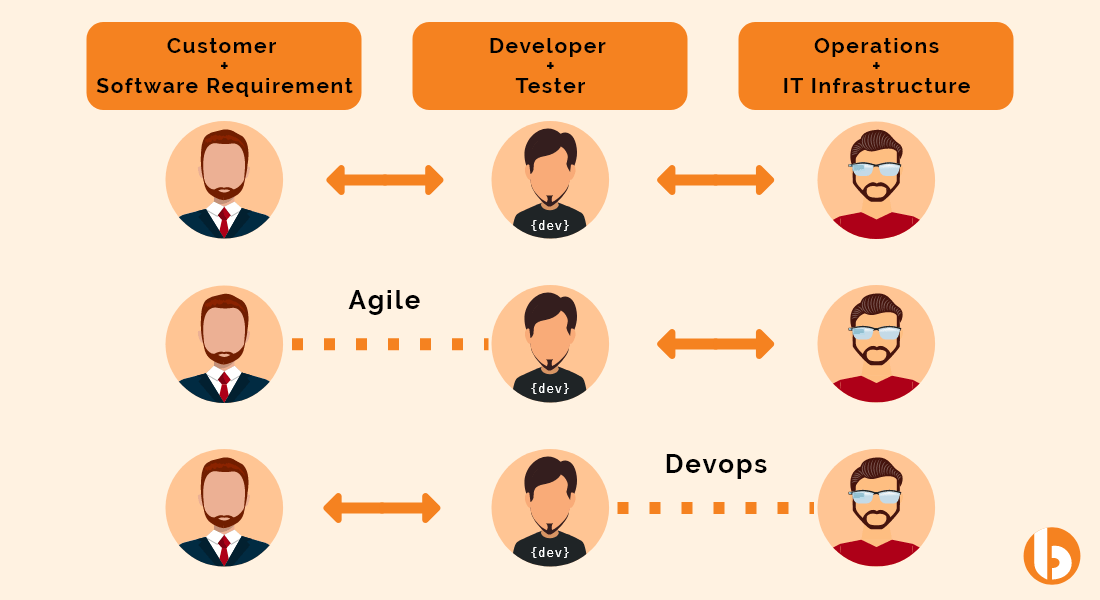
Both Agile and DevOps have turned out to be modern solutions to classic and contemporary business struggles, and yet both have today stood at a neck-to-neck competition. In this blog, we have covered the Agile vs DevOps answers to let you know what exactly does either one means and which approach is suitable for your business hurdles.
Agile vs DevOps: An Introduction to Contemporary Approaches
Let us begin by Agile Software Development Methodology.
In the famous book, Digitizing Boardroom: The Multifaceted Aspects of Digital Ready Boards, Pearl Zhu writes: “Agile is more a “direction,” than an “end,” a philosophy and mindset at board level.”
There are twelve major principles at the core of Agile. Different frameworks such as Scrum, Crystal, Lean, Kanban, and DevOps are integral parts of this philosophical principle of software development.
It employs various services, tools, and application systems that empower teams to create an operational strategy to deal with complicated projects. All these strategies or systems have only one goal: to give the end users complete satisfaction by responding to the rapidly changing demands in a timely manner. And, this is achieved through continuous changes in the code.
Coming to DevOps, here’s our take on it.
DevOps is not exactly like Agile even if it has its origins in Agile and Lean practices. It is a software delivery practice or methodology that empowers enterprises to create a healthy and sustainable coding environment where developers can thrive.
DevOps can also be described as a mindset or an approach that is primarily focused on streamlining the process of software development, including Agile software development among others.
In order to achieve this primary goal of faster delivery of software, it uses automation as its chief strategy or tool. Enterprises that choose DevOps need to train their resources and hire DevOps engineer to develop this mindset to ensure the timely delivery of the product.
Agile vs DevOps: The Difference
Having this basic understanding of Agile and DevOps, it is quite clear that they are two different methodologies for software development. Their primary intention is to execute the software development process seamlessly without any disruption in the fast-paced coding environment.
Their differences, however, start exactly after the development phase of the product. Let us have a look at the Agile vs DevOps inherent differences:
| Area of Difference |
Agile |
DevOps |
| Processes |
Agile consists of processes like Scrum and sprints. |
DevOps is all about actual technical practice. |
| Communication |
Agile is about communication between the developers and the end users. |
DevOps is about more internal communication between the teams involved in the project cycle |
| Way of Communication |
When Agile does internal communication, its purpose is to recognize and resolve issues with specific scrum methodologies. It prefers to use resources that encourage project management and collaboration to resolve issues. |
DevOps is more about fixing issues quickly and that too in real-time. In order to achieve this, DevOps preferred to automate deployment and track errors in real-time. It simply does not hesitate to use automation is even for mundane tasks so there is more focus on the high-end task. This approach eventually ensures that all the tasks are indeed running on the same fast-paced track. |
| Focus |
Agile focuses more on development. |
DevOps focuses more on continuous integration. |
| Philosophy |
The philosophy of Agile is about making customers totally satisfied by adding value to the product. |
DevOps is about creating products that have sustainable business value. |
Methodology |
Agile methods prefer to create, assess, and evaluate the software code. |
DevOps methods revolve around improving the software code constantly and consistently. |
| Human resources |
Agile methods need experts at every stage of software development. For example, any agile framework would assign an expert for its development and testing stages. |
DevOps assign engineers that are responsible for overseeing a specific software development cycle. They are tasked with designing a specific software development cycle that ensures consistent delivery as well as the development of software systems. |
| Technique |
Agile unapologetically emphasizes the use of the empiricism technique. This technique involves observation, adaptation, and examination with the highest transparency. |
DevOps prefers to focus on predictive measures during software development which makes the stakeholders more in control of the process. |
Strategies |
Agile believes in reducing e-waste and adhering to lean practices. |
DevOps implements cost-cutting measures to deliver the software systems in a timely manner |
| Feedback |
Agile invites consumer feedback and gives itself time to process the feedback. |
DevOps demands internal and immediate feedback. |
Using Agile & DevOps Together as a Solution
Before going deeper into how the above-mentioned differences between Agile and DevOps can actually work in favor of the software development process, it would be interesting to explore the combining of these two methods.
| “Because agile and DevOps are tightly linked around delivering value to the customer faster, we often see better success when the practices are paired. Agile needs DevOps to achieve the software delivery speed and effectiveness needed for digital business strategies, and DevOps typically isn’t successful without agile. You can’t truly do DevOps without agile.”
Angela Tucci (General Manager of Agile Management at CA).
|
The common purpose of both Agile and DevOps is to achieve faster and more continuous development and deployment. And, this very purpose can be achieved beyond expectations when these two work in tandem rather than in conflict. For example,
- DevOps is more about automation. It certainly complements the ways of Agile as automation can be a game changer for any development approach or methodology.
- DevOps is more business-centric, while Agile is more customer-centric. The fine balance between the two can create real magic in the entire development process.
- Developers can respond to consumers’ rapidly changing needs quickly.
- As Agile has relentlessly worked on reducing the time frame between changing needs of the consumers and relevant delivery of the same, DevOps can effectively complement the efforts of Agile as DevOps is all about delivering faster and in real-time.
In an era, where technology has become second nature to everyone, the solid partnership between Agile and DevOps promises better and safer software products.
The enterprises are recommended to adopt this partnership to earn better consumer credentials and business value in the market.
|
If you think Agile and DevOps can both benefit your business, but you aren’t sure how to get them together, fear not!
Book a 30 min call with our elite masterminds who will guage your business needs and bring upon a cumulative approach! |
Benefits of Using Agile With DevOps for Software Development
In light of the discussion, it is quite clear that two seemingly different methodologies for software development can actually be great partners, if used wisely. Let us explore some of the major benefits of this wonderful partnership between Agile and DevOps:
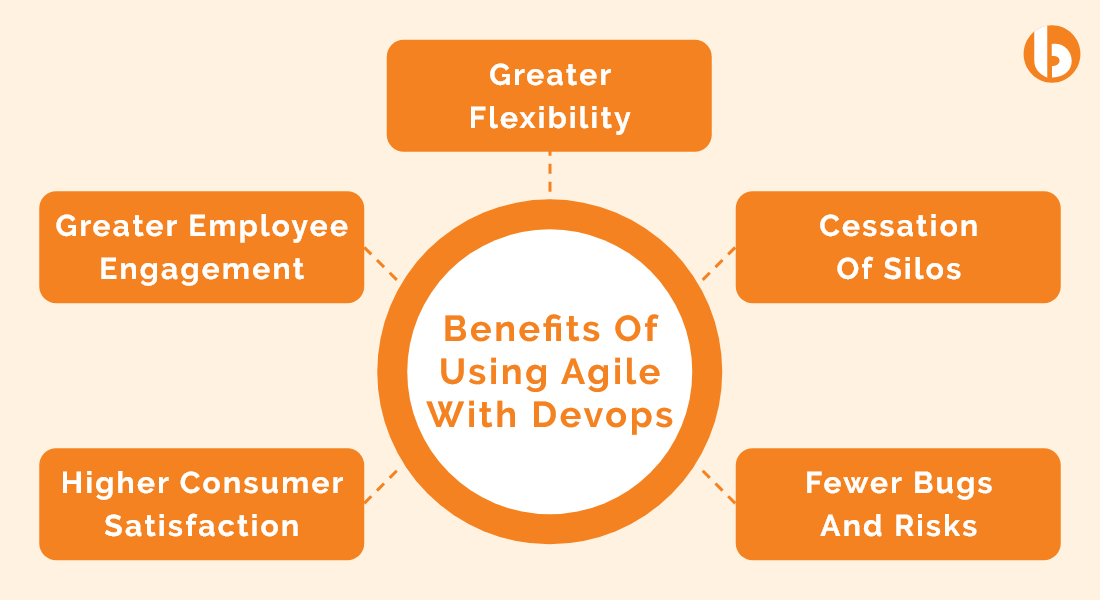
1. Greater Flexibility
Though Agile is a flexible methodology; to arrive at a product that works in the test environment is a long road. DevOps can be of great help in taking the software to the production stage seamlessly and in a timely manner.
2. Cessation of Silos
At times, it has been observed that the Agile production environment creates silos. When Agile and DevOps come together, there is an all-embracing strategy to develop, deliver, and improvise the end product. This organically creates an environment where there are no more silos but a solid community working together for shared values and goals in one direction.
3. Fewer Bugs and Risks
With the combination of Agile and DevOps, every release has fewer risks and more value. This in turn results in increased visibility in secure areas.
4. Higher Consumer Satisfaction
As the team is able to respond quickly, it naturally results in better satisfaction. Consumers are more than happy to have the product as per their changing needs and that too quite easily and in time.
5. Greater Employee Engagement
As the silos stop, employees are encouraged to interact and collaborate more freely and meaningfully. When the employees are fully engaged and feel free to communicate, it naturally reflects in the overall quality of the product.
As per a survey conducted by Coleman Parkes including 1,770 senior business and IT decision-makers at large enterprises in twenty-one countries across the Americas, EMEA, and Asia-Pacific Japan (APJ) regions, when the companies used the combination of Agile and DevOps in their software development processes:
- 75% respondents experienced better employee recruitment and retention
- 45% increase in employee productivity
- 29% increase in consumer satisfaction
- 78% increase in customer experience.
The recorded annual revenues of the surveyed enterprises were more than US$1 billion (or US$0.5 billion in some smaller economies).
Things to Consider When Integrating Agile with DevOps
Here are a few things that you should keep in mind when integrating Agile methodology with your DevOps team:
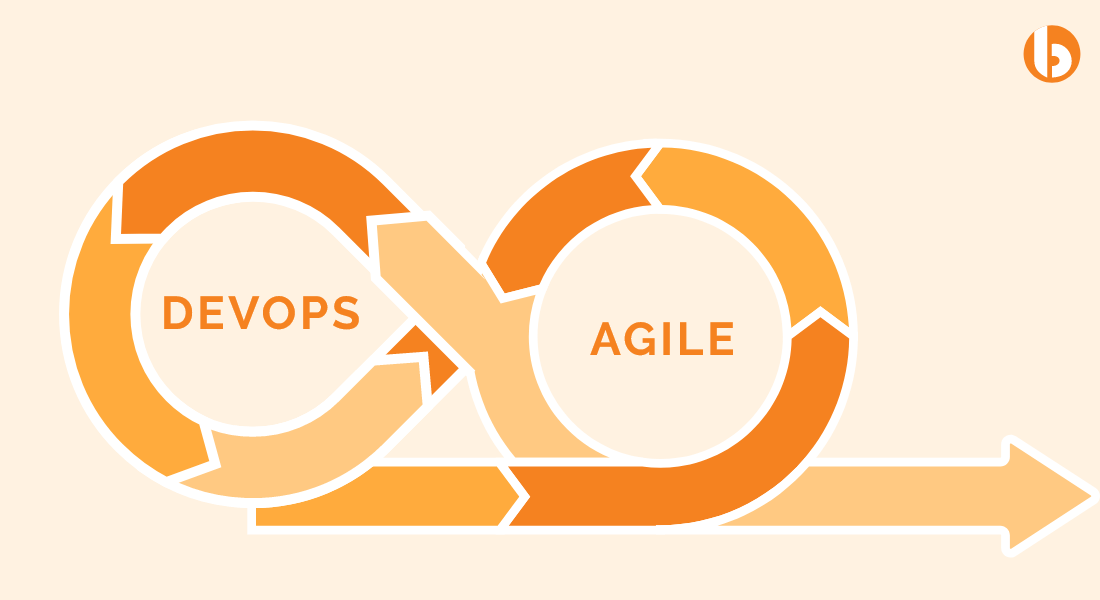
? Improve your teamwork flow such that the product owner, scrum master, and the project manager are not only looking at the software development process but also towards the delivery and maintenance.
? Defining the Product Lifecycle
? DevOps Adoption in every sprint
? Including QA in each phase and stage of integration
? Implement service backlog under DevOps
? Leveraging the right tools
? Automation of workflow
? Keep documentation on track, always
? Measurement and Analysis
Conclusion
It is quite clear that Agile and DevOps is an ideal match made in the world of information and technology. It is entirely up to the leadership and the culture of the enterprise to leverage the maximum benefit of this partnership. The partnership between Agile and DevOps has not remained confined to just customers and employees. It has also brought new business opportunities for enterprises that have adopted both Agile and DevOps.
Frequently Asked Questions (FAQs)
The core benefits of implementing Agile methodology are increased productivity, business value, adaptability, visibility, customer satisfaction, alignment, and decreased risk.
Innovation, faster development & delivery, better resource utilization, greater scalability & availability, automation, stable operating environment, and reduced complexity are the pros of adapting the DevOps.
Some of the pain points while adapting DevOps are increased cost, complexity, lack of standardization, and shortage of DevOps engineers.
Some pitfalls that you may encounter when incorporating DevOps & Agile are defining the development lifecycle, adoption of DevOps in sprints, service backlogging, struggles in tracking management & analysis.






